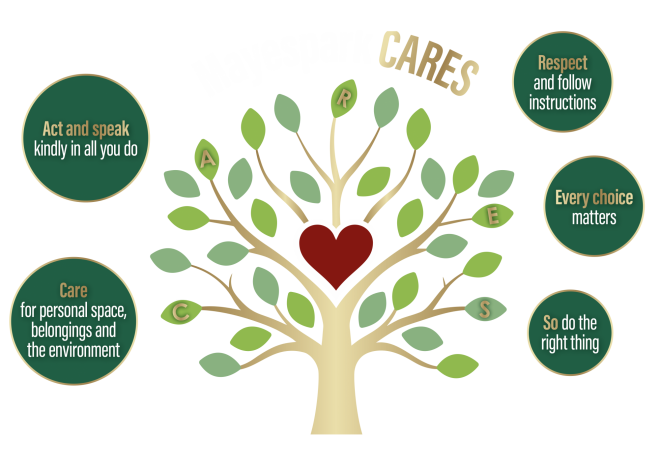Behaviour

Our School Behaviour Policy
We want children to be safe, successful and happy at Mayespark. They and their classmates therefore need to be well behaved both in the classroom and in the playground. They need to be respectful to each other, to their teachers and to others working in our school.
Our school behaviour policy is designed to help us achieve that aim. We believe that our procedures are positive, fair and consistent and will help our children learn to take responsibility for their own behaviour. It is a system that works well.
This pamphlet contains a short summary of the main points, prepared especially for parents, so that you can understand what we are doing and why, and so that you can give us the support we need if the policy is to work.
What rewards can children expect if they choose to do the right thing?
If children choose the right behaviour they can expect their teacher to notice, and to reward their good behaviour. Procedures in each class may be slightly different, but these are some of the things that children can expect:
- Praise from the teacher for what they have done;
- Their name written on the smiley white board;
- Their parents will be told how well they have done at the end of the day;
- Sometimes their teacher will telephone their parents with especially good news;
- Good News letters to parents
- Star of the week
- Star charts - individual names;
- Stickers or stamps on their work or on their clothes;
- To show their work to another teacher, or a senior member of staff
- Table points / small prizes;
- Display table / board for good work;
- End of term awards;
- Special responsibilities / jobs
- Special privileges
What does Assertive Discipline look like at Mayespark?
Our behaviour policy and procedures are based on a system of Assertive Discipline. This includes:
- a set of whole school rules;
- a set of rewards that children should expect to receive in every class if they follow those rules;
- a set of consequences that children know will follow if they choose to break the school rules.
These are included in the pamphlet and are displayed throughout the school.
What are the principles behind our Assertive Discipline policy?
- It is the positive feedback and encouragement above all else that makes Assertive Discipline work. All staff must recognise and encourage choices of good behaviour;
- Teachers have the right and the responsibility to clearly define the limits of acceptable and unacceptable behaviour;
- Teachers have the right and the responsibility to ask for assistance from parents and from the senior staff of the school when support is needed in handling the behaviour of pupils;
- To keep everyone safe, children need guidance and limits set for them;
- All rules must be taught and then reinforced, children can only really choose to do the right thing if we have been absolutely clear about what we expect;
- Children are responsible for their choice of behaviour;
- Most children can behave if they want to;
- We reject the children’s behaviour, not reject the children themselves;
- Children need to realise that there are rewards for choosing good behaviour and consequences for choosing unacceptable behaviour;
- Assertive discipline does not destroy children’s self-esteem.
What is lunchtime ‘Review’ and how does it work?
Lunchtime Review is given for unacceptable behaviour in the playground only, and applies only to our Y2-Y6 children. Children in Review spend their lunch break inside school reviewing their behaviour, instead of playing in the playground. We use lunchtime Review to ensure our playground is as safe as possible for all our children, and to make sure that our lunchtime supervisory staff are treated with respect. Review is given for:
- fighting
- deliberately hurting another child
- deliberately damaging equipment
- refusing to follow the instructions of supervisory staff/teacher on duty
- extreme rudeness to supervisory staff/teacher on duty
- Racism or language of intolerance
What are our school rules?
- Be kind and respect others:
- Do not swear or call people names;
- Do not make fun of other children or their families;
- Keep hands, feet and objects to yourself
- Don’t take anything that doesn’t belong to you
- Follow instructions given by all school staff;
- Look after your school and everything in it;
- Always work hard and try your best;
- Do not stop other children from working;
- Speak when it’s your turn, listen when it’s not;
- Walk around school quietly and sensibly;
- Leave sweets, chewing gum and toys at home.
What are the consequences if children choose to break the rules?
If children choose to break our school rules then these are the things that will happen. Remember, when you break a rule you are making a choice.
Stage 1: Warning;
Stage 2: ‘Time Out’ in class for 5 minutes sitting apart from other children;
Stage 3: ‘Time Out’ in another class in the same year group for 15 minutes, with work;
Stage 4: A ‘Blue Letter’ is sent home to parents that day, signed by SLT
Stage 5: SLT is called to support with the behaviour
Stage 6: Internal exclusion for the remainder of the lesson
Stage 7: Continuous poor behaviour will result in an internal exclusion for the rest of the day
A child will move to Stage 4 if they damage property with intent, are violent or aggressive, swear, or get to Stages 2-3 for the third time in the week.
In cases of very serious behaviour, a child may be excluded straight away. This may take the form of an internal exclusion in school, or a fixed term suspension where the child is not allowed to attend school.
